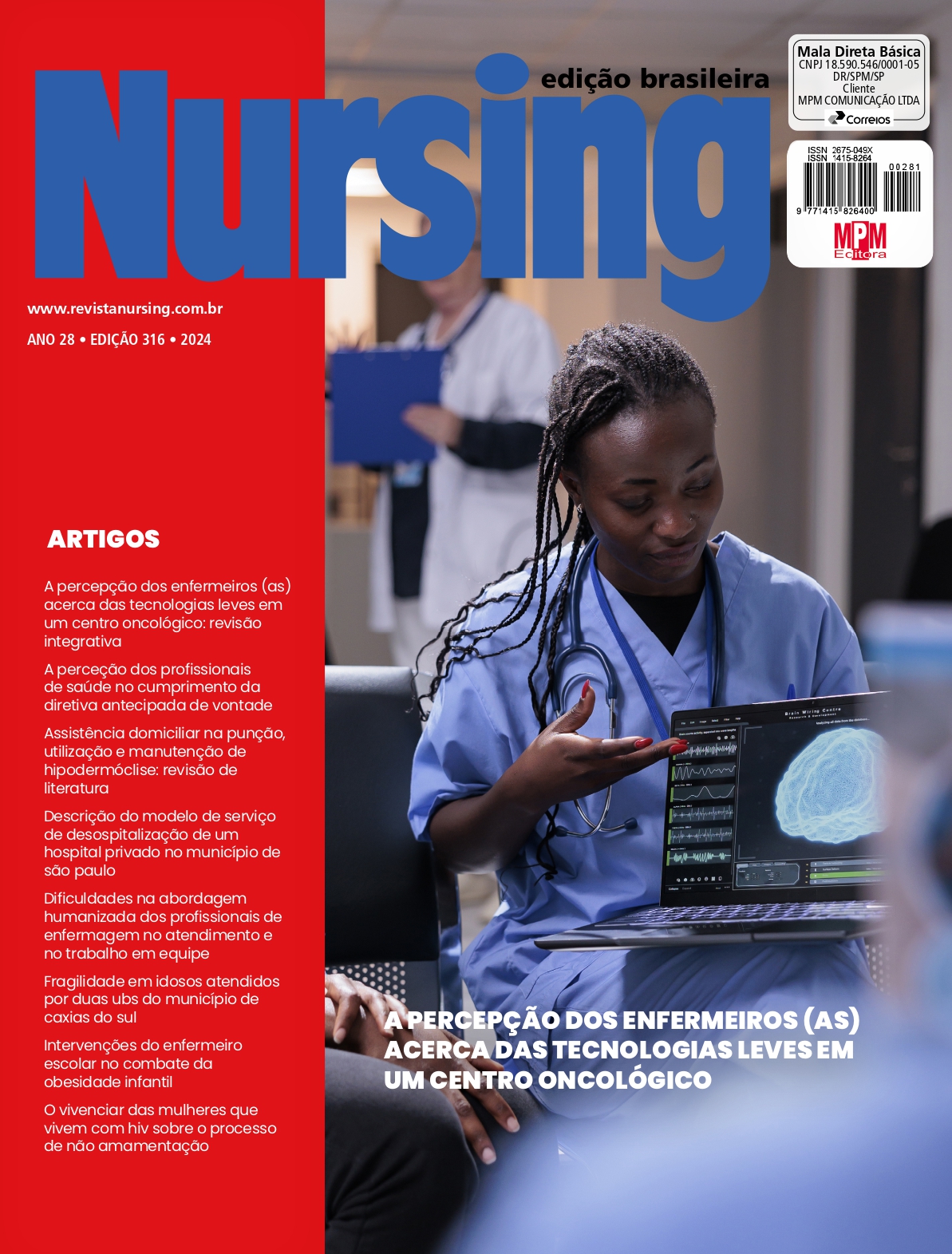THE PERCEPTION OF HEALTH PROFESSIONALS IN COMPLIANCE WITH ADVANCE DIRECTIVES
DOI:
https://doi.org/10.36489/nursing.2024v28i316p10152-10156Keywords:
Testaments regarding life; Health professionals; Nursing care.Abstract
to understand the perception of health professionals in complying with the Advance Directive (AD), in order to
contribute to improving care. Method: qualitative, exploratory and descriptive paradigm, semi-structured interview aimed at nurses and doctors from an intensive care unit and an intra-hospital support team in palliative care at an acute hospital. Findings subjected to content analysis. Ethical-moral procedures were respected. Results: health professionals understand the AD as an instrument that offers information regarding the wishes of the sick person. It was also identified that participants
understand that in order to comply with the AD, several needs must be met, namely: training; greater dissemination and information; creation of alert systems; greater awareness of AD management and greater objectivity in the decisions made by the team. Conclusion: health professionals are aware of the issues surrounding AD, recognizing the need for sustained intervention that responds to the wishes expressed by the person at the end of life. They focus on training, marketing, knowledge and communication as relevant factors for decision making. From this perspective, it is essential that health
professionals focus on the person as a foundation of ethics, in which individual autonomy and interpersonal relationships are aspects taken into consideration for the humanization of care.
References
Hassegawa, L.C.U., Rubira, M.C., Vieira, S.M., Rubira, A.P.A., Katsuragawa, T.H., Gallo, J.H., & Nunes, R.M.L. (2019) Approaches and reflexions on advance healthcare directives in Brazil. Rev Bras Enferm. 72 (1):256-64. DOI: http://dx.doi.org/10.1590/0034-7167-2018-0347.
IAHPC. Global Consensus based palliative care definition. (2018). Houston, TX: The International Association for Hospice and Palliative Care. https:// hospicecare.com/what-we-do/projects/consensus-baseddefinition-of-palliativecare/ definition/ .
LEI N. º25/2012. DR I série 136 (16-07-2012) 3728-3730.
Gómez-Batiste X. et al. (2018). Chair ICO/UVIC-UCC of palliative care at the University of Vic – Central University of Catalonia: an innovative multidisciplinary model of education, research and knowledge transfer. BMJ Supportive & Palliative Care, 0:1-8. Doi: 10.1136/bmjspcare-2018-001656 .
Leloup, J. Y. (1998). O corpo e seus símbolos: uma antropologia essencial. Petrópolis: Vozes. Nunes R., & Melo H.P. (2012). Testamento Vital. Coimbra: Editora Almedina SA.
Capelas, M. et al. (2017). O direito à dignidade – serviços de Cuidados Paliativos. Lisboa:
Universidade Católica Portuguesa Editora.
Dadalto, L. (2015). História do testamento vital: entendendo o passado e refletindo sobre o presente. Mirabilia Medicinæ. 4, 23-42.
LEI N.31/2018. DR I série 137 3228-3229.
Saccol, M. (2016) Testamento Vital: em busca de uma aplicabilidade prática coerente com ideologia do instituto. [XIII Seminário Internacional demandas sociais públicas na sociedade contemporânea & IX mostra internacional de trabalhos científicos].
Nunes R., & Melo H.P. (2012). Testamento Vital. Coimbra: Editora Almedina SA. Pacheco, S. (2014). Cuidar a pessoa em fase terminal: perspectiva ética. Lusodidacta.
Fortin, Marie-Fabienne- Fundamentos e Etapas do Processo de Investigação. Loures: Lusodidacta, 2009. ISBN 978-989-8075-18-5.
Bardin, L. (2016). Análise de conteúdo. Edições 70.
Rodrigues, A. R. S. (2017). Estudo do regime das diretivas antecipadas de vontade em Portugal na ótica dos profissionais de saúde. [Tese de Mestrado, Universidade de Lisboa]. Repositório Universidade de Lisboa. http://hdl.handle.net/10362/32133.
Barreto A.L. & Capelas, M. (2020). Conhecimento dos profissionais de saúde sobre as diretivas antecipadas de vontade. Cadernos De Saúde, 12(1), 36-40. https://doi.org/10.34632/cadernosdesaude.2020.5.834.
Chehuen Neto, J. A., Ferreira, R. E., Silva, N. C. S. da, Delgado, Á. H. D. A., Tabet, C. G., Almeida, G. G., & Vieira, I. F. (2015). Testamento vital: o que pensam profissionais de saúde? Revista Bioética, 23(3), 572–582. https://doi.org/10.1590/1983-80422015233094.
Cogo, S.B., Lunardi, V.L., Quintana,A.M., Girardon-Perlini,N.M.O. & Silveira, R.S. (2017) [et al.] -Assistência ao doente terminal: vantagens na aplicabilidade das diretivas antecipadas de vontade no contexto hospitalar. Revista Gaúcha de Enfermagem. 38(4),1-8. https://doi.org/10.1590/1983-1447.2017.04.65617 .
Saioron, I., Ramos, F. R. S., Schneider, D. G., Silveira, R. S. da, Silveira, L. R., Saioron, I., Ramos, F. R. S., Schneider, D. G., Silveira, R. S. da, & Silveira, L. R. (2017). Advance directives of will: nurses’ perceptions of benefits and new demands. Escola Anna Nery, 21(4). https://doi.org/10.1590/2177-9465-ean-2017-0100.
Alves, RMM (2015). Fim de vida em cuidados intensivos: a(s) prática(s) dos profissionais de saúde. [Tese de Mestrado, Instituto Politécnico de Viana do Castelo]. Repositório Científico IPVC. http://hdl.handle.net/20.500.11960/1453 .
Vaz Batista, M., Patrocínio, J., Moraes, R., Proença, L., Louro, F., & Major, M. (2022). Diretivas Antecipadas da Vontade: A Propósito de Um Caso Clínico. Medicina Interna, 25(4), 296–299. https://doi.org/10.24950/rspmi/CC/113/42018.
Soares, C.S., Pinho, C. & Costa, M.I. (2023). Contributos na avaliação do grau de satisfação da pessoa em cuidados paliativos. Revista de Investigação & Inovação em Saúde, 6 (1), 19-33. https://doi:10.37914/riis.v6i1.225.
Velasco-Sanz, T., & Rayón-Valpuesta, E. (2016). Advance directives in intensive care: Health professional competences. Elsevier Espanha. ISSN, 40, 154–162.








